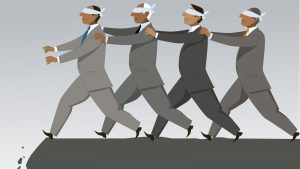A few weeks ago, I sat in a meeting for one of the various clubs that I am a part of. This meeting was very typical, each role discussing the work they had done in the past week, and putting forward any items that may be of attention. When the roles behind marketing brought up their current projects, I quietly sat and nodded in agreement to their ideas as were the rest of the group. However, I felt as if their implementation plan could have been improved upon with a few adjustments. I felt as if I was just a first year representative, and he knew better as the Vice President of Marketing. More importantly, I was a victim of groupthink. 
Groupthink “describes situations in which group pressures for conformity deter the group from critically appraising unusual, minority, or unpopular views” (1). In this particular case, I was exactly conforming to team’s agreement on the idea, without expressing my own. Consequently, I was not playing to the strengths of the group decision making process. Groups are strong in bringing more input into the decision making process, opening up “the opportunity to consider more approaches and alternatives” (2). It is important to note that I might have not been the only other member that exhibited silence at that time. Other members may have felt the same way but had stuck to conformity for the same reasons, thus further perpetuating weaknesses within the group. So how do groups play to their strengths and avoid groupthink?
In an article by Dr. Ben Dattner, he views a case study that fields potential solutions to groupthink within a team. He highlights former U.S. President Robert Kennedy’s initiative in playing devil’s advocate throughout the Cuban Missile Crisis, “vigorously arguing against contemplated courses of action in order to force the group to discuss and debate the contingent merits of different strategies” (3). As such, Dattner highlights the importance that leaders should take in order to force further discussion on decisions, might it be through playing devil’s advocate such as Kennedy. This will lead to the increased input that groups look for, being able to formulate a more well-devised plan, and minimizing the hindrances of groupthink.
- Langton, Robbins, Judge, Organizational Behaviour, 7th edition, p. 423.
- Langton, Robbins, Judge, Organizational Behaviour, 7th edition, p. 422.
- Ph.D., Ben Dattner, Gwen Dewar Ph.D., Alex Lickerman M.D., and Nando Pelusi Ph.D. “Preventing “Groupthink”.” Psychology Today. N.p., n.d. Web. 02 Apr. 2017.